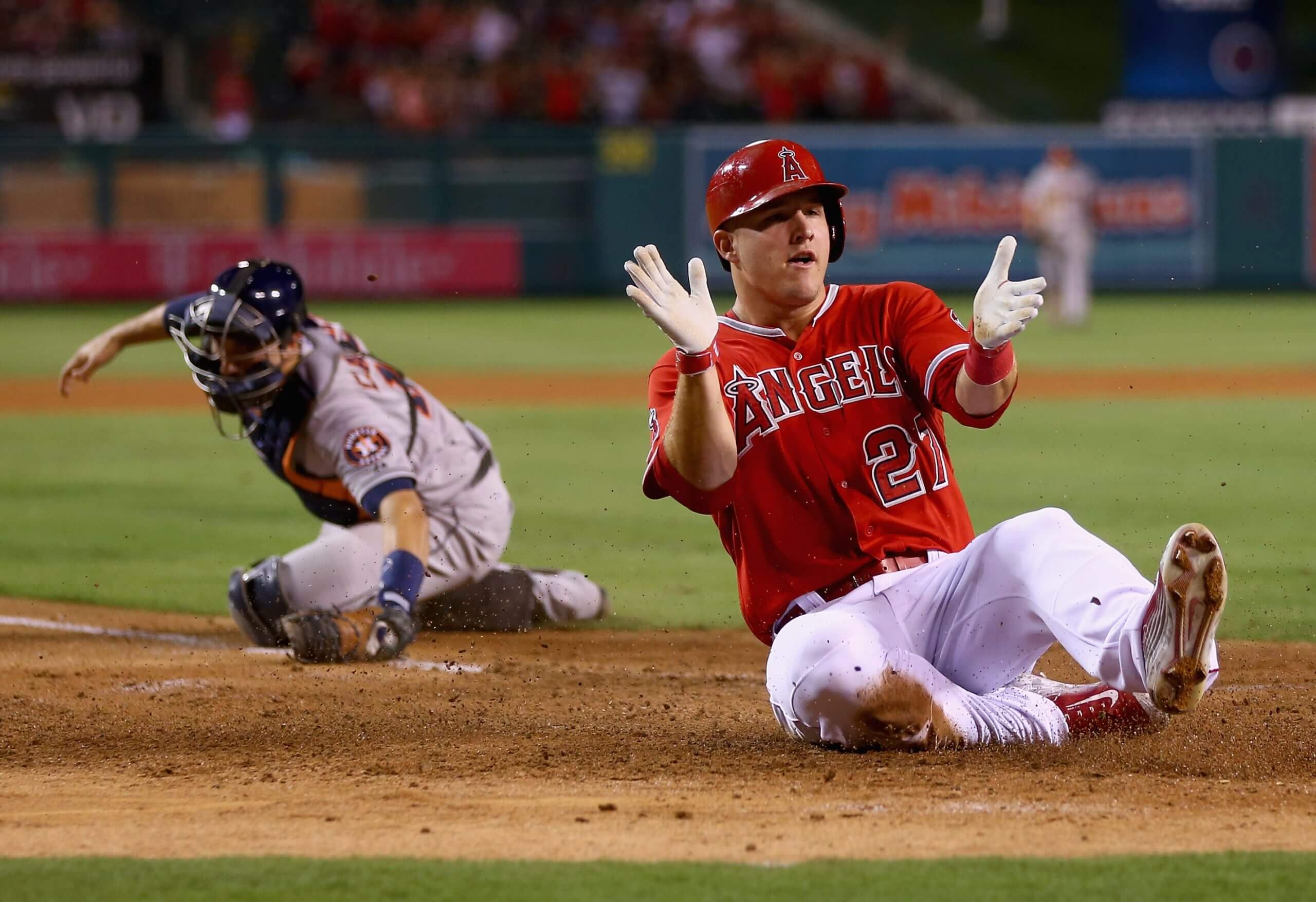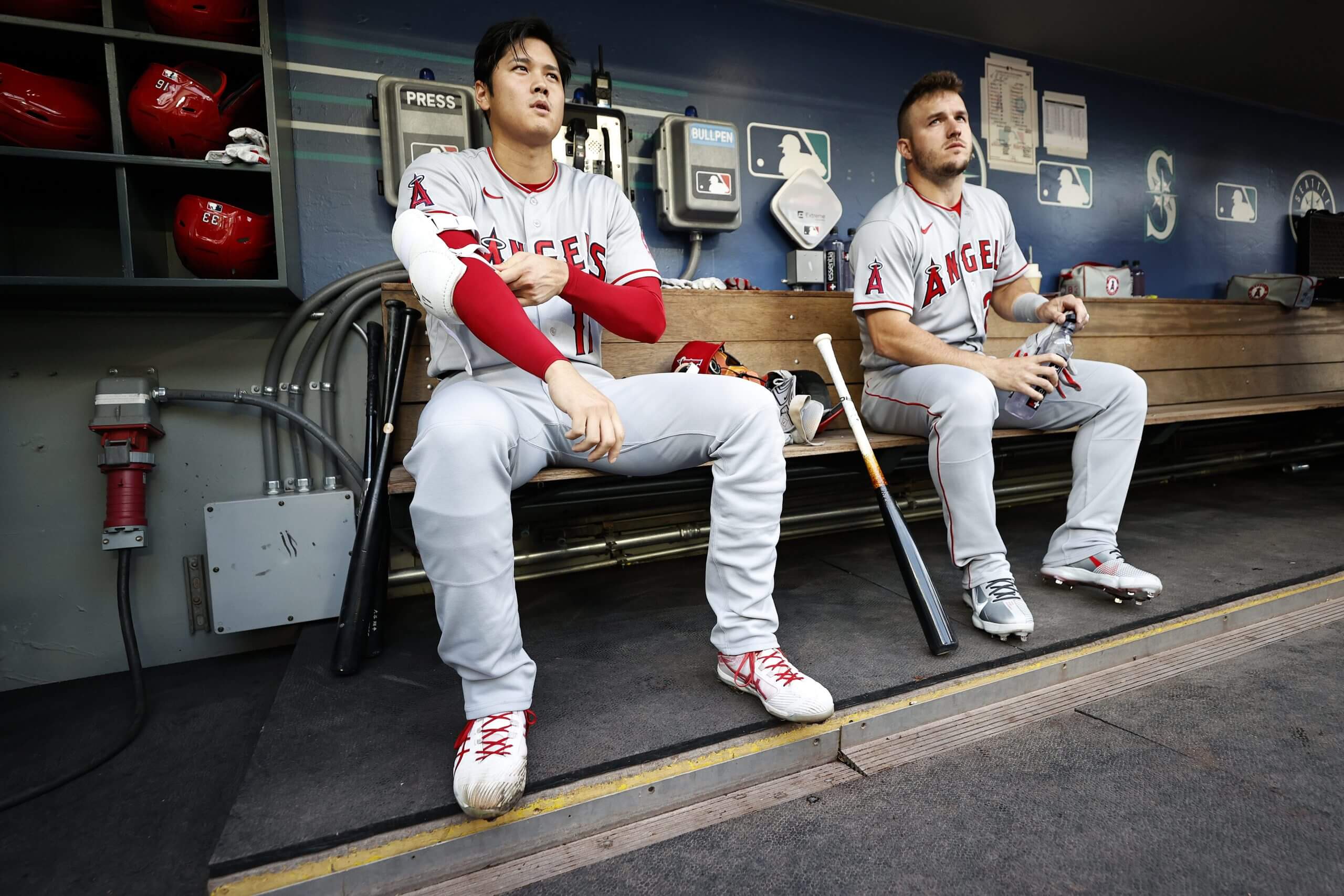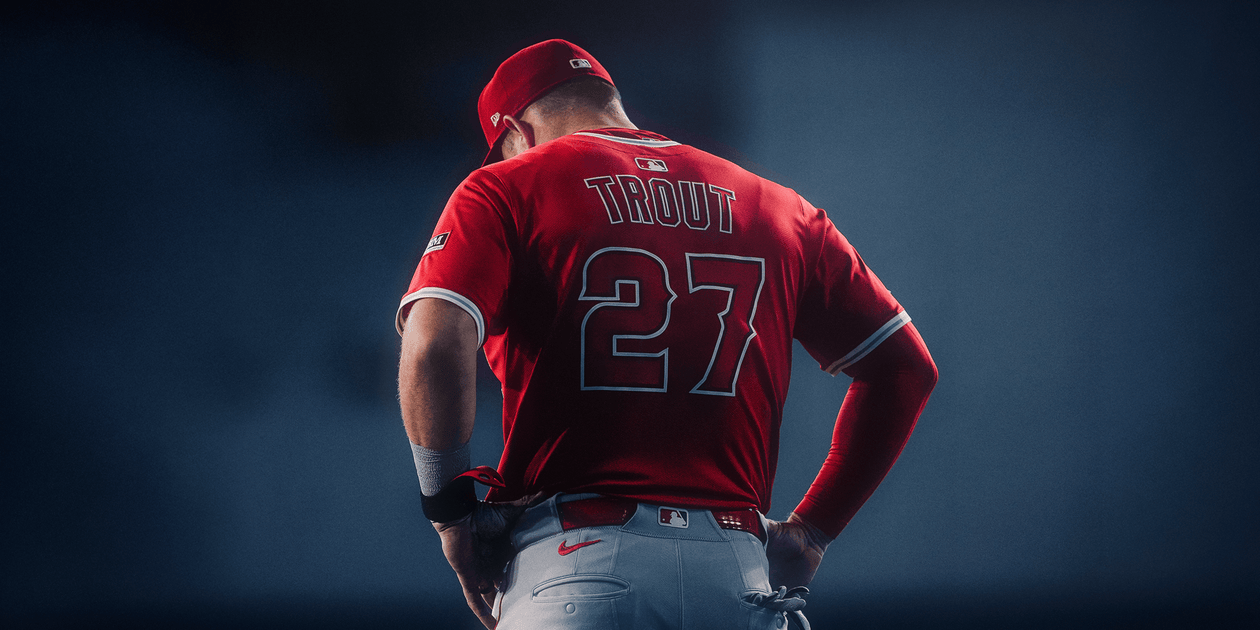It’s the third weekend in January 2013, and it’s unseasonably warm in New York, with temperatures climbing into the low 50s. There is much to celebrate.
Some of baseball’s biggest stars congregate at the New York Hilton to collect the prestigious Baseball Writers Association of America Awards for the previous season, including MVPs Miguel Cabrera and Buster Posey and young stars Mike Trout and Bryce Harper, named Rookies of the Year for the American and National Leagues, respectively.
Harper, perhaps the most touted prospect of all time — a Sports Illustrated cover story dubbed him “The Chosen One” as a 16-year-old — received 16 of 28 first-place votes in a standout first full season for the Washington Nationals. But Trout, a unanimous selection from the Los Angeles Angels, was otherworldly; fitting for a player nicknamed the “Millville Meteor,” a nod to Trout’s New Jersey hometown, by a fan editing his Wikipedia page.
Trout won a Silver Slugger for his offensive prowess and a Fielding Bible for exceptional center-field defense. His 10.5 WAR season was so good — only Aaron Judge (10.8 in 2022 and 2024) and Mookie Betts (10.7 in 2018) have produced better campaigns since — that it sparked serious debate in the MVP race. Cabrera, who won the Triple Crown, got 22 first-place votes. Trout, who finished second, got the other six.
The Angels rented out the swanky 21 Club to celebrate their budding superstar, who had turned 21 a few months before. Coming off back-to-back winning seasons, they had the player to power them back into prominence, to recapture the glory of 2002-09, when they went to the playoffs six times and won five division titles and a World Series. To step out of the long shadow cast by the crosstown Dodgers.
Trout and the Angels returned to the playoffs in 2014, falling to the Kansas City Royals in a three-game ALDS sweep. They have not been back since. They haven’t won a postseason game since 2009, the year Trout was drafted. Both streaks are the longest in baseball.
In the expanded postseason era, it’s never been easier to get to October. But another World Series has come and gone, and baseball fans looking for Trout this fall might have been best served to check for him in the stands of his beloved Philadelphia Eagles. Or in a Santa Ana, Calif., courtroom, testifying in the wrongful death lawsuit of former teammate Tyler Skaggs.
Trout is a generational talent, a player who should have been plastered on Times Square billboards and cereal boxes. Once, during his rookie season, he hit a two-hopper down the line at the old Texas stadium and ran to first base in a blistering 3.82 seconds. Trout’s leaping home-run robbery of former Orioles shortstop J.J. Hardy that year was so unbelievable that a photo of it still hangs in the back of Baltimore’s visiting clubhouse in tribute. He hit for the cycle at age 21, the youngest AL player ever to do so.
In his prime, the three-time MVP was a baseball god, drawing comparisons to Mickey Mantle. Now 34, Trout is coming off the worst offensive full season of his career, one in which he played in 130 games but faded from the sport’s consciousness.
The rogue Wikipedia editor was prophetic: Trout’s rise was meteoric, a streak of light that shoots across the sky and then burns up as it enters Earth’s atmosphere.
“He was the best player out there, and he was so young and he had all the tools, the passion for the game. He was Mike Trout and it kind of disappeared, which is sad,” said former Angels third-base coach Dino Ebel. “Not making the playoffs, not being in big moments, not in October … he kind of got left behind.”
Trout was big and fast, strong and agile — “a linebacker who ran like Rickey Henderson,” said former Angels broadcaster Victor Rojas. He could hit for contact, hit for power, run the bases and play the field.
Ahead of his third full MLB season in 2014, the Angels bought out his arbitration years and signed him to a six-year, $144.5 million extension. Trout, who wouldn’t be a free agent until 2020, rewarded the club’s faith in him by winning the AL MVP.
In 2015, a year when Trout posted an AL-leading .991 OPS and finished second in MVP voting, the Angels lost their final game of the season, ending any hopes of a tiebreaker to get into the playoffs and finishing 85-77. It was their last winning season to date.
Trout continued to play winning baseball: In the past 30 years, only former teammate Albert Pujols added more win probability to a team through his age 28 season. He finished first or second in MVP voting from 2012-16 and 2018-19 ( he finished fourth in 2017 after missing six weeks with a torn thumb ligament) while sporting a .308/.422/.587 slash line.
By the time he was entering the final year of his extension, Trout had already amassed Hall of Fame numbers. But the Angels weren’t seen as an up-and-coming team anymore, coming off of three sub-.500 seasons in which they finished 20-plus games out of the AL West lead — not to mention the July 2019 overdose death of Skaggs, which implicated a team staffer and cast a pall over the organization.
Still, a one-on-one with owner Arte Moreno helped seal the deal for Trout, and the 12-year, $426 million contract he signed to stay with the Angels in March 2019 was then the richest in the history of North American sports. Trout was sold on the team’s approach, convinced that Moreno was committed to building up the team, even if it meant paying more luxury tax.
Trout signed away the rest of his career on that promise. Some in the game openly wondered why, especially when it seemed to be based on little more than blind faith.
He did more than take his place in the lineup. He weighed in on draft picks and tracked their progress. It wasn’t unusual for him to talk about prospects, particularly minor-league hitters, with members of the team’s front office late into the night. He cared about who was coming up around him and the foundation of the organization, even as it shifted around him.
Since signing that mega-deal, Trout has had five managers, including interim managers (the Angels hired a sixth, Kurt Suzuki, last month). The front office has also turned over, with four GMs since Trout was drafted. The only constant has been Moreno, who briefly put the Angels up for sale in 2022 before changing his mind.

Trout was first or second in American League MVP voting for seven years starting in 2012. (Jeff Gross / Getty Images)
For years, the hashtag #FreeMikeTrout has popped up during baseball season. But Trout doesn’t want to be freed. Of the more than a dozen people The Athletic spoke to for this story, not a single one thought Trout would ever ask Moreno to move him, what Trout called “the easy way out” in 2024. A trade seems especially unlikely now given Trout’s age, injury history, declining performance and a contract that still has roughly $190 million on it.
So what will it mean for his legacy if this is it?
Trout’s boyhood hero was Derek Jeter, who spent his whole career with the New York Yankees. And while Trout’s WAR long ago eclipsed Jeter’s, his legacy is different. Jeter was elevated by the Yankees’ mystique and five World Series rings. Trout played on Angels teams that were generally out of contention and off the national radar while the Dodgers dominated the local market.
“If you play for long enough, the numbers are going to be there,” Jeter said. “I do think playing in a media market on the east coast — Boston, New York, Philly — you are gonna get a lot more attention. The way you get around that is being in the postseason.
“I think that’s what people remember most, is when you win in October.”
When Jeter was coming up, he “and everyone” wanted to be Ken Griffey, Jr., the most popular player in the game despite playing in Seattle, a relative baseball backwater. Griffey, though, won a playoff series at 25 (the 1995 ALDS over the Yankees) and appeared in two more. Plus, he played with a flair and charisma — who can forget the iconic backwards hat? — that Trout never exuded. At the peak of his popularity, Trout was notorious for turning down marketing opportunities.
“Player marketing requires one thing for sure — the player,” commissioner Rob Manfred said of Trout in 2018. “You cannot market a player passively.”
Trout has been described as blue-collar his entire career, and he takes commitments seriously. There is time for his family and time for baseball, an office in California and a home in New Jersey. He still believes in the organization that drafted him and committed a record-breaking amount of money to him.
“That sort of loyalty is a positive trait to me,” said Cal Ripken, Jr., who spent his entire Hall of Fame career with the Baltimore Orioles. “He wants to do it there, and I can relate to that. I wanted to do it here, but it’s a risk.”
Ripken won the World Series in 1983, his second full-time season, and committed to stay in Baltimore. He returned to the postseason in 1996 and ‘97, but never advanced past the AL Championship Series. The Hall of Famer said the only aspect of his career he regrets is not winning more championships.
“I hope (Trout) gets the feeling of playing in the postseason again. I thought it would happen for me every year after (‘83),” Ripken said. “But I don’t think it would change the way people look at him. Ernie Banks never won a World Series, and it doesn’t change the player he was.”
Plenty of great players never won a World Series. But Griffey, Barry Bonds, Ted Williams and others all at least won a playoff game. Banks was an icon, but his stats pale in comparison to Trout, who owns a WAR of 87.5, the highest ever for a modern player who hasn’t won a postseason game. To find a player with a better WAR and no playoff success, you have to go back to Nap Lajoie, who debuted for the Philadelphia Phillies in 1896, 99 years before the invention of the wild card.
“If you told me (when Trout signed his contract in 2019) he would still be waiting to go back to the playoffs, I wouldn’t believe you,” Ebel said. “Zero chance.”
Trout is obsessed with the weather, amusing considering he’s played in Southern California since 2011. He loves tracking storms, following popular meteorologists and talking about atmospheric pressure. But he’s not perfect at forecasts.
In summer 2016, Trout planned to propose to his longtime girlfriend, Jessica Cox, via sky writer. A plane would write the message in the air — “Will you marry me, Jess?” — while the two of them had lunch at the beach. But Trout got the forecast wrong, and the planes had to be called off and rescheduled for a break in the weather.
Trout already had a commitment he was unwilling to cancel — a charity thing with children— so he improvised. He told Cox he wanted to go to Starbucks and started up Interstate 5 (with teammate Garret Richardson and wife tailing them). The planes traveled up the coast along the same path, trying to find an opening.
They finally got one, and Trout promptly pulled off a highway exit — and into a hotel parking lot in Irvine, where he popped the question. Afterward, he drove to the event, smiled and took photos with the kids like nothing happened.
“He never panicked or tried to reschedule his other commitments,” then-Angels PR head Tim Mead said. “That’s the Mike Trout we all know. It didn’t go as planned, but it all worked out. And I think it will work out for Mike Trout and the Angels.”
If he would never be on the big stage as the face of Major League Baseball, it seemed a solid bet that Trout would at least serve as the face of the Angels organization for as long as he was in Los Angeles. But in December 2017, the team announced it had signed Shohei Ohtani, the two-way Japanese star. And as Ohtani blossomed into a modern-day Babe Ruth, Trout’s body betrayed him.
Trout averaged 145 games per season through 2019, but excluding the COVID-19-shortened 2020 season, he has missed at least a month in each of the last five years. He suffered a strained calf in 2021 and missed 122 games. A back injury in 2022 cost him 30 games, and a fractured hamate bone in 2023 forced him to miss all but one of the Angels’ final 75 games. In nearly all of those cases, Trout’s rehab process lasted longer than initially expected.
The pair did enjoy one blockbuster moment together, but it came in March 2023, when Trout’s Team USA faced off against Ohtani’s Team Japan in the final of the World Baseball Classic. In front of 6.5 million viewers, Trout came to the plate with two outs in the bottom of the ninth and USA trailing 3-2. Ohtani, who was brought in to pitch the game’s final frame after going 1-for-3 as Japan’s designated hitter, struck him out swinging to win the tournament.
Trout was teammates with Ohtani for six seasons before Ohtani signed with the Dodgers that December, but the pair were in the lineup together in just 46.6 percent of Angels games over that span, and the team went just 194-211 (.480). Ohtani and the Dodgers have won World Series titles in each of the seasons since.

Trout and Shohei Ohtani (left) were teammates for six seasons, but it wasn’t enough to get the Angels back to the postseason. (Steph Chambers / Getty Images)
Each spring for at least the past three years, Trout vows to get back to his old form. He says his doubters — like MLB Network, which ranked him as the 39th-best player in the league last year — serve as motivation. The question of How to Keep Trout Healthy looms large in Angels camp and eventually develops into a national storyline, one that this year began with him moving from center to right field to reduce wear and tear on his legs. He didn’t play in the field after April due to lingering soreness with a surgically repaired left meniscus, and some in the industry think Trout’s days as a regular DH may be close, if not already here.
Last year, Trout fell out of MLB’s top 20 in jersey sales, a list where he consistently ranked in the top 10 ever since his arrival (at No. 5) at the end of the 2012 season. This summer, Trout wasn’t voted as an All-Star by fans for the first time since he came up.
“I’ve got (five) more years on the contract,” Trout told The Athletic in September. “That’s what fuels me. I feel like I’ve got a lot left in my tank. And I know when it’s right, I can be the best.”
Even Trout’s march to 400 home runs lacked the expected exuberance, as he went a career-high 125 plate appearances between Nos. 398 and 399 before crossing 400 in late September. Trout became one of only 20 players to accomplish the milestone with just one team with a 385-foot bomb against the Colorado Rockies. Afterward, the fan who caught the ball had one request: a simple game of catch with Trout on the field.
There’s still a chance at a happy ending, or maybe just a happier one. Todd Helton spent his entire Hall of Fame career with the Rockies and reached the World Series in his age 33-season in 2007. Even an organization as downtrodden as Colorado went to the playoffs in 2017 and ‘18. With the addition of the third wild card, anything seems possible.
“I think his body may give out before the contract runs out,” Rojas said. “But if he can hang on and the Angels can do it — I know it’s a long shot — it will be so great for Mike and for the entire sport.”
“I don’t want his career to end like this,” Ebel said. “I’m still pulling for him. I think a lot of people are.”

